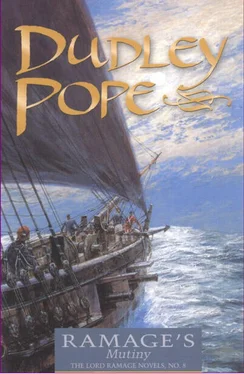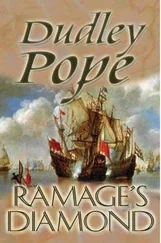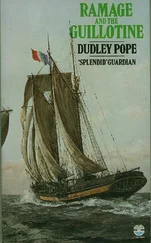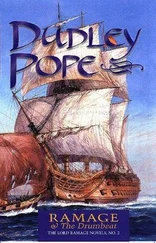Dudley Pope - Ramage’s Mutiny
Здесь есть возможность читать онлайн «Dudley Pope - Ramage’s Mutiny» весь текст электронной книги совершенно бесплатно (целиком полную версию без сокращений). В некоторых случаях можно слушать аудио, скачать через торрент в формате fb2 и присутствует краткое содержание. Жанр: Исторические приключения, Морские приключения, на английском языке. Описание произведения, (предисловие) а так же отзывы посетителей доступны на портале библиотеки ЛибКат.
- Название:Ramage’s Mutiny
- Автор:
- Жанр:
- Год:неизвестен
- ISBN:нет данных
- Рейтинг книги:5 / 5. Голосов: 1
-
Избранное:Добавить в избранное
- Отзывы:
-
Ваша оценка:
- 100
- 1
- 2
- 3
- 4
- 5
Ramage’s Mutiny: краткое содержание, описание и аннотация
Предлагаем к чтению аннотацию, описание, краткое содержание или предисловие (зависит от того, что написал сам автор книги «Ramage’s Mutiny»). Если вы не нашли необходимую информацию о книге — напишите в комментариях, мы постараемся отыскать её.
Ramage’s Mutiny — читать онлайн бесплатно полную книгу (весь текст) целиком
Ниже представлен текст книги, разбитый по страницам. Система сохранения места последней прочитанной страницы, позволяет с удобством читать онлайн бесплатно книгу «Ramage’s Mutiny», без необходимости каждый раз заново искать на чём Вы остановились. Поставьте закладку, и сможете в любой момент перейти на страницу, на которой закончили чтение.
Интервал:
Закладка:
Just forward of the gunroom there were two cabins to larboard, belonging to the Captain's clerk and bosun, and two to starboard, occupied by the gunner and carpenter. A larger cabin formed the midshipmen's berth, normally crowded but now occupied only by Paolo Orsini and a master's mate. Forward of them, abreast the mainmast, the Marines slung their hammocks while the seamen had the rest of the deck forward.
Aitken began towelling his bony body. He knew the effort would leave him dripping with perspiration, but he was happy to be back with Captain Ramage, Southwick, Wagstaffe and Bowen, despite the discomfort. He had enjoyed his brief command of the Juno and her captain's quarters were spacious: the great cabin running the width of the ship, the smaller one called the coach, and a third which was the bed place.
Spacious (by comparison with his present cabin) and even luxurious, with sideboard, wine-cooler, chairs, settee and desk, but lonely. That was what had hit him the moment he was given the temporary command. The captain's accommodation formed the after end of the main deck; everyone else, officers, petty officers, seamen and marines lived on the next deck below. That alone increased the sense of isolation: the knowledge that he was alone and above all the others, like a spinster occupying the top floor of a house, with all the other residents on the ground floor.
Yet that was only part of it: most of the isolation came from the fact that the man living in that accommodation was the captain; he made the decisions and gave the orders. He had to be right the first time, and for the sake of discipline (and perhaps pride) he could not ask for second opinions.
The Captain ate alone, unless he invited some of his officers to dinner; when he was not walking the quarterdeck he was alone in his cabin, reading, thinking, brooding or sleeping. To someone who had never experienced this almost terrifying isolation, a captain's life seemed easy: he never stood a watch (although he left orders that he was to be called when land was sighted, if the course could not be laid because of a wind shift, or for a dozen other reasons) and really did not work, apart from signing papers prepared by his clerk, writing up his |ournal (usually borrowing the master's log and copying it) and generally making sure that the officers did their jobs properly.
Aitken now knew from experience what envious young lieutenants, dreaming of the day they would be made post, never considered. The captain had the final responsibility for everything in the ship. If she sprang a leak and sank because the pumps became blocked with rubbish, ran on a reef after the master made a mistake or the current ran faster or slower than expected, lost a mast when rigging failed or wood rotted, was sunk after attacking an enemy too powerful, or ran away when admirals considered she should have stayed and fought - all these were the captain's responsibility: he was the person court-martialled even though the real fault could lie with dozens of other men, ranging from the officers of the deck to a seaman heaving the lead and calling out a wrong sounding.
The safety of the ship, in good weather and bad, on passage or in battle, was only part of it. The surgeon's job was to cure the men's illnesses, but a good captain did his best to make sure the men did not become ill in the first place. Captain Ramage, for instance, was fanatical in going to any length to make sure (here were fruit and fresh vegetables for the men whenever possible, and many a time the cook's mate's hands had been raw and stinging, crushing fresh limes to provide the juice issued to the men daily to ward off scurvy.
Yet, Aitken reflected as he began dressing, the physical health of the ship's company was also only part of the story: there was ulways trouble among two hundred seamen. Hot weather shortened tempers; fights occurred in a few seconds, men who had been friends for months had bitter quarrels and applied to change their mess, deciding they wanted to try their luck with a group of another six or eight men. A man received a letter from home relating some tragedy or crisis; another began hoarding his tot so that he could get blind drunk every few days. A man sulking over an actual or imagined injustice at the hands of a petty officer would slack. One man merited promotion while another ought to be demoted . . .
These were the normal problems in a well-run ship, and in each case the captain had to decide what to do: he had to be a judge one minute and a father the next; a medical man and a navigator. Yet not every ship was well commanded. The pleasure - yes, that was the right word - of serving with Captain Ramage was not that he was always right (the whole ship's company knew how uncertain his temper was before breakfast) but that he cared. If he was wrong then it was not likely anyone else would have been right. He treated his men as though they were his sons, though many were his age and the majority much older. Southwick, for instance, could have been his father.
It showed in many ways. He watched their diet to keep them fit; but like a true father he made damned sure they did their work properly. He rarely flogged a man (none in Aitken's time, and according to Southwick only twice in his whole career), but Aitken had seen seamen who would have preferred the lash of the cat to the lash of the Captain's tongue.
As he pulled on his stockings, smoothing out the wrinkles, Aitken realized that he was in effect assessing Captain Ramage because he had been thinking a lot about Captain Wallis and the Jocasta. Something had gone dreadfully wrong on board that ship, and although no one yet knew exactly what it was, Aitken was becoming more and more certain that if any one man was to blame it was Captain Wallis.
Which is where his gloomy thoughts started: in a ship everything depended on the captain. Aitken knew that Admiral Davis had been surprised when he asked to be allowed to remain with Captain Ramage instead of being made post and given command of a frigate, but the reason had been simple enough: he did not think he was yet fit for command. Not that he couldn't handle a frigate - that was easy enough - but he wanted to learn more about keeping a ship's company well disciplined but happy. It boiled down to having a seaman call you "sir" because he regarded you as the captain, not because you were the man put in as captain and backed up by the Articles of War.
Aitken suspected that Captain Wallis had commanded his ship by waving his commission in one hand and the Articles in the other, forever charging men with breaking an article and setting the bosun's mates to work with the cat. With Captain Ramage the only time the men heard of the Articles of War was every fourth Sunday when, by regulation, they had to be read aloud.
If the Navy suddenly turned republican, he thought, the men would elect Lord Ramage as their captain. Lord Ramage - it was hard to remember he was a lord and, when his father died, would become the Earl of Blazey. How many men in the Navy had a title but refused to use it? Perhaps he would now that he was a captain. According to Southwick it had started when he was a midshipman, when a twelve-year-old with a title might find himself in difficulties on shore when he ranked above his captain socially, and often his admiral as well.
Aitken tried to picture Captain Ramage as a young midshipman. He must be about twenty-five now. No doubt as a youngster he would have been in constant trouble with his mathematics: even now he knew just enough to make him a good navigator, but no more, and would often make jokes at his own expense about his poor mathematics, or tease Southwick, who had an uncanny knack for adding up rows of figures in his head. What he lacked in mathematics he made up for in seamanship: Aitken had watched him handling the ship on scores of occasions and he did it quite instinctively. As a good rider seems part of his horse, so Captain Ramage seemed to be part of the ship. The way he handled the Juno when he put her alongside this very ship, for example . . .
Читать дальшеИнтервал:
Закладка:
Похожие книги на «Ramage’s Mutiny»
Представляем Вашему вниманию похожие книги на «Ramage’s Mutiny» списком для выбора. Мы отобрали схожую по названию и смыслу литературу в надежде предоставить читателям больше вариантов отыскать новые, интересные, ещё непрочитанные произведения.
Обсуждение, отзывы о книге «Ramage’s Mutiny» и просто собственные мнения читателей. Оставьте ваши комментарии, напишите, что Вы думаете о произведении, его смысле или главных героях. Укажите что конкретно понравилось, а что нет, и почему Вы так считаете.











